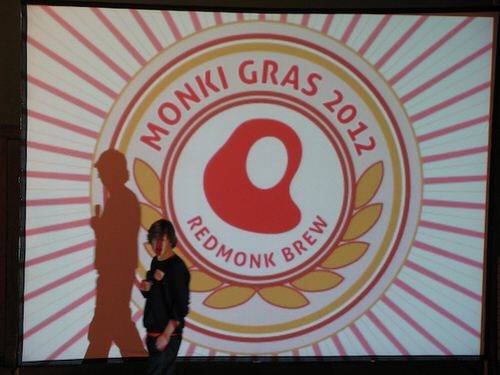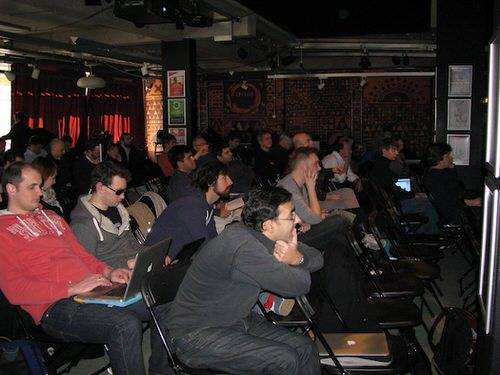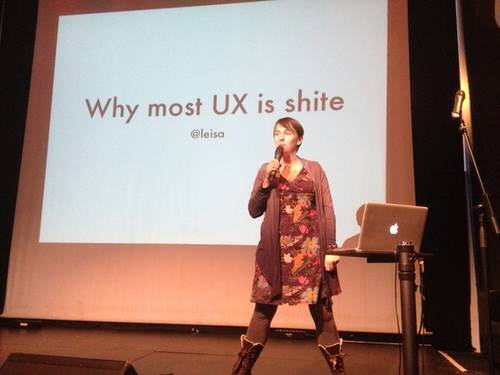If you didn’t make it to London for Monki Gras, the follow on conference to Monktoberfest, you missed out on quite a lot of great content and beer.

The conference is organized by RedMonk, an unusual analyst firm. Their conferences, reflecting the analysts at RedMonk, are unusual as well. The Portland, Maine event was primarily organized by RedMonk co-founder Stephen O’Grady, who resides in Maine. This time around, the event was primarily organized by RedMonk co-founder James Governor.
Conference as a Joke
Some industry events have a very serious air about them. Things like VMworld or the Open Source Business Conference (OSBC) have a very button-down feel about them, and tend to be highly skewed towards sponsor-driven content. Read: sponsors get speaking slots, and it shows. Many of the talks are little more than extended commercials, and tend to be about as interesting and informative as reading sales brochures.
James Governor paces the stage at Monki Gras

The RedMonk conferences, on the other hand, started as a joke. When the RedMonk folks joked about combining a beer and developer conference, though, they found that people weren’t laughing. They were asking “when,” “where” and “how much”?
The price for a two-day conference, which included catered lunch and dinner with a generous and interesting selection of beer? The tickets ranged from £99 to £140, depending on when you purchased the tickets. (Disclaimer: As a speaker, I did not pay for a ticket for the event. I did pay my own travel.)
Diversity and Expanded Agenda
Some of the speaking line-up was carried over from Monktoberfest, which is OK since few of the attendees who attended Monktoberfest were likely to attend Monki Gras. Matt LeMay reprised his talk on “kitteh vs. chikin”, Greg Avola of Untappd was back (though with a different talk) and Donnie Berkholz (now a RedMonk analyst) gave his “Assholes are Ruining Your Project” talk.
But there quite a few new talks as well, especially since the agenda was expanded to two days at popular demand. I particularly enjoyed the CTO vs. vice-president of engineering talk between Jason Hoffman and Bryan Cantrill of Joyent. It was not your typical, dry and dull conference fare.
Which brings me to an important point. The RedMonk conferences are a bit more rowdy than other conferences. Nobody had a “perform like a pr0n star” moment, and none of the talks were offensive at all. However, speakers did drop some f-bombs and were generally much more casual than other shows.
One of the things I dinged Monktoberfest on was the lack of diversity. The speaking line up had no women, and there were few women in attendance as well. I spoke to Governor and O’Grady about the line-up and their response was that they were aware of the problem, but had invited a few women to speak but they were not available on the date for Monktoberfest. They did assure me that they’d make an effort to have a diverse line-up for the next event, and were good at their word.
Laura Merling of Alcatel-Lucent, UX guru Leisa Reichelt, and Bocoup’s Irene Ros were all on the agenda. Was it equal time? Not quite, with two days of talks Monki Gras had a lot of speakers and most were men. However, it’s notoriously difficult to recruit women to speak at tech conferences. I spotted a lot more women in attendance at Monki Gras, as well, so I think that the organizers are doing what they can to provide a solid set of talks with a diverse set of speakers.
Talk Highlights
Kohsuke Kawaguchi of CloudBees had a short slot to talk about building a community around an open source project, based on his experience with Jenkins. Stop me if you’ve heard this before: A lone developer starts working on something as a hobby, and ultimately creates a project that’s used by a huge community. Jenkins may not be quite as ubiquitous as Linux, but for a project that started as a one-man show in 2004, it’s grown impressively.
How do you get contributors to your FOSS project? Kawaguchi suggests that developers “think about the conversion funnel.” Usually reserved for marketers and sales folks, Kawaguchi reminded the audience that “every developer starts as a visitor.” Visitors have to be able to find the resources they need to become users, before they become developers.
Kawaguchi also asks developers to make sure their code is modularized. It’s easier for people to hack small pieces than one big blob. Some developers may only care about a small part of a project. And “it’s good software engineering anyway.” The division of labor is greater than collaboration, says Kawaguchi.
The PhoneGap talk by Andre Charland and Dave Johnson was also interesting. Charland and Johnson went through the history of PhoneGap through its purchase by Adobe. The lesson they learned around PhoneGap? You don’t need sales people, you don’t need marketing. If you have a really strong FOSS project like PhoneGap “people just start calling you.”
If you remember the Apache considered harmful post and O’Grady’s “you won’t get fired for using Apache” post, then Mike Milinkovich of Eclipse had a talk that was a must-see. Not surprisingly, Milinkovich wasn’t in agreement with the anti-foundational messaging in the Apache post, or O’Grady’s somewhat weak defense of foundations. He made a pretty strong case for foundations as a vendor neutral place for development that provides governance, IP management, project lifecycles, community oversight and norms, etc. Unfortunately, due to the nature of Monki Gras, a lot of talks were very short. This is good in that it’s hard to have a terribly boring talk in 20 minutes. It’s bad, though, when someone like Milinkovich probably could have gone longer and had more interesting things to say. All good things come to an end, though.
Day two at Monki Gras

After day one’s programming came to an end, the attendees were treated to a catered dinner and a beer tasting contest led by beer expert Melissa Cole. Each table was designated a “team captain” and attendees were taught a bit about beer and then led through a practice round of tasting and trying to identify beers.
Obviously the Monki Gras attendees were enthusiastic about beer, but are they knowledgeable? Well, certainly moreso now than before. I think we found that a lot of beer fans are experts on what they like, but not necessarily at identifying types of beers.
The selection of beers during dinner was interesting, and featured six British and three Belgian beers. This includes treats like Thornbridge Jaipur, Freedom Pilsner, Oakham JHB and Trappistes Rochefort 8. Note that attendees were served amounts appropriate to tasting during dinner, not nine full pints of beer. After dinner, attendees may have consumed that or more, as the beer was flowing pretty freely and there was apparently an after-party that went until past 4 a.m. In the interests of being prepared and awake for my talk the following day, I didn’t make it to that one.
Day two featured a slightly smaller crowd, slightly the worse for wear, at a different venue across town.
Day two’s content was just as strong as day one. In fact, I think that Why Most UX is Shite by Reichelt was probably my favorite talk. Why does most UX suck? According to Reichelt:
Leisa Reichelt at Monki Gras

- Organizations don’t make decisions. Users have to make them instead. (Too much fear in deciding.)
- You think your opinion counts. Reichelt makes the point that all too often designers are influenced too strongly by the people they work closely with, instead of the people they’re designing for. (But don’t interact with as often.)
- You don’t measure it. Reichelt says that “companies don’t have good acquisition metrics or retention metrics or engagement metrics, let alone cohort analysis.” The things they track are not ideal for actually making good products.
- You don’t really care. Companies talk a good game, but they’re not designed around user experience.
- UI is a symptom of organizational culture. “All of these things are hard and most of them start much higher up in the organization than the average UX designer ever gets to. Good UX is cultural. If you want to hire a freelancer to ‘do UX’ , it’s like putting a plaster on gangrenous leg.”
Worth the Trip?
Following the shorter agenda on the second day, the attendees adjourned to the bar next to the venue to continue talking and trying beers. It’s a testament to the strength of the conference that so many folks hung around to talk to one another afterwards.
As I’ve said before, the most significant track for any event is the “hallway track,” and the RedMonk team have generated a really strong one. Software developers and people that need to work well with developers should seriously consider attending the next event, if it’s feasible. Monki Gras is easily one of the best events I’ve been to for actually connecting with other folks and learning about what’s going on in the rest of the industry. Cap that off with good beer and food, and what else could you want from a conference?

















